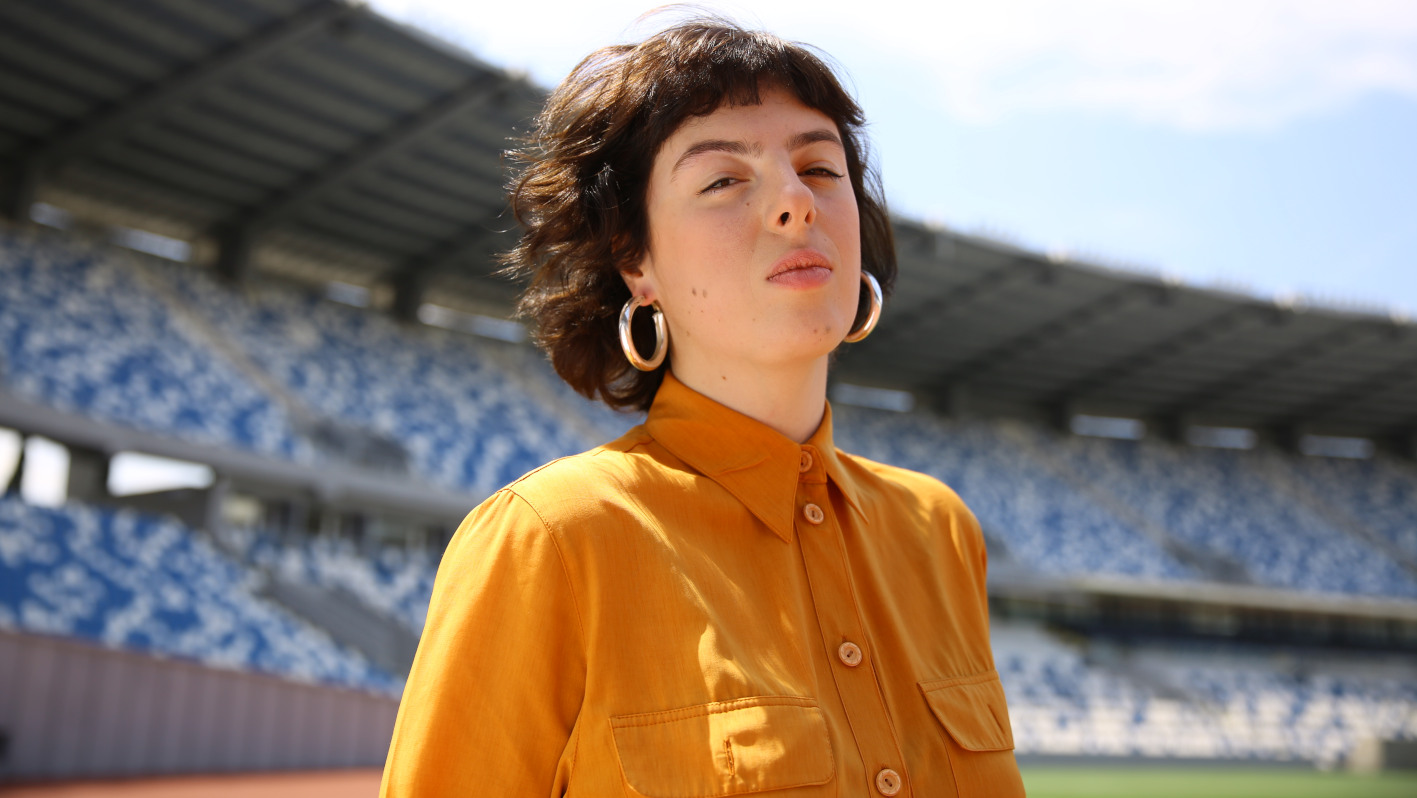Photo: Leko Tchkonia (Newa)
The world is still crazy about Tbilisi’s club scene but even though Bassiani and Khidi attract DJs and clubgoers from all over the world, there’s only a few Georgian DJs and producers who were able to make a name for themselves outside their own country. As a part of the Icontrax label, Newa tries to bring the music of Georgian producers to an international crowd, but the musician and DJ is receiving more and more attention herself. After releases on La Chinerie, Semantica and a contribution to Ben Klock’s latest Klockworks compilation, she is currently finishing a new EP for the latter – perhaps including one or even both of the previously unreleased tracks in Newa’s contribution to our Groove podcast.
You are a classically trained musician, played jazz as a kid and were making experimental music. When you however discovered Datacide’s legendary Datacide II album, it made you explore techno more. What was it that fascinated you about this particular record?
The diversity of the music on this album is what blew my mind when I listened to this record for the first time – how it can take you from ambient to techno and then back to where you started. Life is a journey, a trip. Sometimes when we’re looking for something particular in life it has been there all the time but you couldn’t or wouldn’t see it until you experience life. The resemblance of this music to our lives was the reason that fascinated me about this masterpiece. Life can be dark, life can be beautiful, painful, hardcore, all sort of things can happen anytime, it can be everything or nothing. The pleasant sensations in my body when finding out the natural side of it. The complexity and symmetry of the sounds which we as humans find beautiful. I still think about it, whenever I’m listening to it it’s totally different every time. It’s timeless. I wish I could create something in my lifetime that will be timeless. This is my goal.
How did your relationship with techno develop after that?
A lot! Even my sets became so diverse. My mood swings are well known to people who know me, and I tried to incorporate that into my production and into my sets. Sometimes people tell me that they can hear two tracks in one when I produce something. It just comes out naturally and also from my DJ experience, as I blend tracks I like together they marry each other and if the marriage is good, will they fight? Will they divorce? I’m trying to play a little game and to imagine things like I used to when I was a child.
Your own productions are remarkable for their dense sound design. What does your working process look like? You have recently started working with hardware, correct?
Thank you. In the beginning when I was producing only on my laptop and just using low quality headphones, I was really struggling but the amazing Thomas Fehlmann told me that you can use whatever you want, you don’t need a high quality studio to make a good piece of music if you have talent and you can adapt to things. It affected me a lot, I started listening and producing even more with my bad equipment and I figured out I’m fine with it. Then, after some time passed, the equipment you have is the tool and everything is in your hands, it makes everything easier and you can be more creative. After I started working with hardware I already had my experience with bad equipment. I learned quicker and it became so much fun. It is an almost scientific thing, to research and learn more about what we hear, what texture is, complexity and symmetry in music. Making music became like a research process for me, one which is not just about music. I read and learn a lot about biology, psychology, scientific literature, trying to find out more about nature. We are part of this world. I’m still learning and I enjoy the process a lot.
As part of the label Icontrax, you shine a light on the regional Georgian scene. Would you say that local producers and labels have benefited from the interest the international club community took in spaces like Bassiani and Khidi?
Of course it brought attention to us which is amazing, but mostly to the clubs and not the producers. I wish there was more interest in what kind of music people are making here, what we are feeling. Also generally speaking the internet has become such a mess, the PR companies, the business side of it has become bigger. We as Icontrax don’t want to bother anyone, we are there, you can find about us if you search a little bit, like a small house in a huge metropolitan city which has different experiences to offer.
About a year ago, you participated in the spontaneous protests in Tbilisi after police raids at Bassiani and Café Gallery the night before. During the protests, the Georgian youth expressed a more general dissatisfaction with the socio-political situation in Georgia. One year on, how would you characterise the current status quo?
The good thing is that clubs are still open every weekend and have a lot of guests, but police is still using force against clubgoers and they chase them after they leave the venue, frisk them for drugs and use their power against us – disturbing small groups on the nearby territory after they leave the venues and terrorising them basically. We still need to work on that and shift people’s minds about clubs and peaceful clubgoers. Most of them are the part of Georgian society that can bring about change, who can create a better life in this country. Slowly we are moving towards the better place that we have dreamed of, but our government needs to stay out of it and just help with low-priced airplane tickets, maintaining a good relationship with the Western world as most people get inspired by traveling in foreign countries, bringing their experiences back to Georgia and our society.
What was the idea behind your contribution to our Groove podcast?
I appreciate musicians trying to play only new records in their mixes, but my idea was to carefully blend the 90s and our era because as I said good music is timeless. And it’s about the trip, blending and experimenting with sound. I included some of my tracks, Skyra and HVL alongside foreign established artists.
Last but not least: Where can we see you behind the decks in the next weeks and what are your plans as a producer and label co-owner?
I’ll be playing in USA, for the first time in Detroit, Boston and in the newly opened Basement club in New York, which I’m very proud of as my longtime friends Gega and Tea are managing it who lived in Georgia and moved to the US where they worked hard to achieve opening a new club in Queens. I’m gonna play in Germany in June at TBA Dresden, Somedate Festival Weimar and the remarkable Berghain for the third time. I’m always super excited to play there, as the tension, space, sound and atmosphere is always unforgettable. I’m releasing a solo EP on Ben Klock’s Klockworks imprint, which has become an established, respectable label that is as loved as Ben himself. I’m feeling honored and happy to be part of Klockworks and the Photon party series which is held all over the world. For Icontrax we don’t have particular plans yet, dreams and wishes are a plenty but we try to release vinyl, which is very expensive for us. We recently released a podcast with unreleased material by Skyra.
Stream: Newa – Groove Podcast 211
01. Oscar Mulero – The Arms of Fate
02. Slv – Transition
03. Nocow – Starveme (feat. Tayut Ogni)
04. Skyra – Unreleased
05. HVL – Alien Discotheque
06. Donato Dozzy – Back
07. Planetary Assault Systems – Give it up
08. Dustin Zahn – Submit Yourself
09. Binny – Missing Link
10. Ben Sims – Acid Od
11. SPX – Concrete Faces
12. Aubrey – Inner Passions Out
13. Lucy – Dyscamupia (Paused)
14. Newa – Unreleased
15. Newa – Unreleased (Upcoming)
16. Danilenko – Mutilate
17. DBX – Super Freak
18. AGF – Cognitive Modules Party [Ki Edit]
19. The Advent – There’s No Danger





